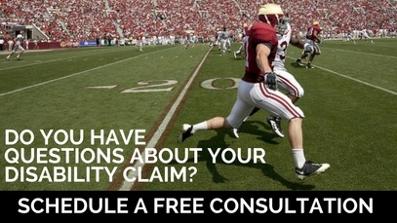Three Reasons Why Athlete Disability Claims Get Denied

Long term individual disability insurance, free agent drop-in-slot protection, and loss of endorsement coverage are necessary to protect an athlete’s future income in the event of a permanent, career-ending sickness or injury.
However, like claimants from all other professions, many athletes struggle and don’t collect their disability insurance benefits. Insurance companies look for each and every reason to avoid paying out these high-stake, high-dollar claims, and many athletes make fatal claim missteps that are hard to overcome. Here are three reasons why many professional athlete disability claims are denied.
1. Poorly negotiated, misleading policy language
Pro athletes negotiate for better contracts all the time, so why should insurance policies be any different? Athletes should negotiate the best possible insurance policy language by addressing these questions:
- Does the policy have riders, exclusions and limitations? Are they unreasonable?
- Is the coverage comprehensive enough to meet my needs?
- How does the policy define a disability or career-ending injury?
Athletes who sign up with standard language are likely to have a harder time collecting benefits. For example, if policy language states there must be an accident that is the sole and direct cause of the career-ending injury, athletes can expect a nightmare of weasel-worded definitions as cause for denial.
In this case, insurers will ask, were there any prior injuries? Did they result in missed practices or games? Could this injury have caused or contributed to the symptoms of the alleged disability? Insurance carriers often use narrow definitions of disability and accidents, combined with the athlete’s own medical history, to weaken or deny the claim for benefits.
An expertly negotiated policy that tailors to the needs of the athlete and minimizes the amount of exclusions and limitations will increase the likelihood of a timely payout.
2. Failure to meet internal policy deadlines
Deadlines are a seemingly simple but frustratingly difficult aspect of the insurance claims process. Many disability insurance policies have strict time limits for filing or giving notice of a claim. Failure to meet these proof of loss deadlines is a sure-fire way to ensure a denial of benefits.
Any athlete filing a claim needs to pay close attention to these time limits, as well as any bad faith tactics that might contribute to missed deadlines or rushed, poorly completed forms submitted to meet short deadlines.
For example, ex-NFL player Haruki Nakamura alleges that his insurance company subjected him to “virtually impossible, hair-trigger notice procedures; voluminous and duplicative paperwork; no fewer than three layers of administrative bureaucracy … and interminable delays in its ‘investigation’ of Nakamura’s claim.”
Athletes filing a disability claim should expect to face the duplicitous delays that Nakamura allegedly experienced, as they are textbook insurance bad faith tactics. Repeatedly sending duplicative information that the insurer allegedly did not receive can delay important steps in the claims process, which in turn may cause claimants to miss crucial deadlines and ensure the denial of benefits.
3. Imperfectly completed policy application/claim forms
Insurance claim forms are notoriously complicated and misleading, which is why athletes must answer each question fully to avoid fatal mistakes during the application process and at policy delivery time.
Insurance companies have a field day when they find omitted, partially submitted or missing information on an application. Between the policy delivery and the alleged injury, the carrier will investigate thoroughly and look for an excluded injury or sickness that contributed to the covered loss. Even an innocent mistake, such as forgetting to disclose a seemingly minor disorder that sent a player to the trainer’s table, can lead to a denied claim or rescinded policy.
If a claim is made, insurers often cite that misinformation and call it fraud. The insurer can claim the athlete concealed, misrepresented and committed fraud by failing to fully disclose what they deem “pertinent medical information.” As a result, the insurer can rescind the policy, return the premiums and avoid paying the athlete millions of dollars in claim benefits.
Understanding, anticipating and sidestepping common insurance company delay and denial tactics can mean the difference between wasting thousands on a premium and timely collecting disability benefits.
Professional athletes seeking disability benefits should align themselves with highly skilled attorneys experienced in handling high-stake insurance matters for exceptional athletes.



